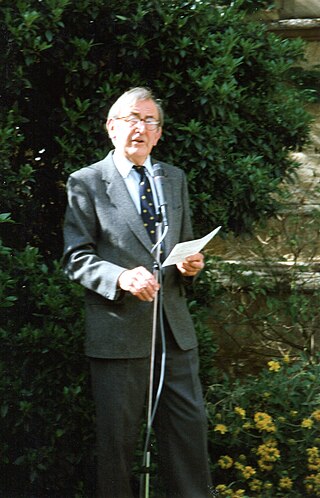A praelector is a traditional role at the University of Cambridge and the University of Oxford. The role differs somewhat between the two ancient universities.
At Cambridge, a praelector is the fellow of a college who formally presents students during their matriculation and the graduation ceremony at Cambridge, especially during the Congregation of the Regent House when degrees are conferred.
At Oxford, a praelector may be a fellow of the college, but may also be a college tutor who is responsible for running an honours school in the absence of a fellow. A praelector may also hold a college fellowship.

David L. Smith is a noted historian at Selwyn College, Cambridge. He specializes in Early Modern British history, particularly political, constitutional, legal and religious history within the Stuart period. He is the author or co-author of eight books, and the editor or co-editor of seven others, and he has also published more than seventy essays and articles.
David Wiggins is an English moral philosopher, metaphysician, and philosophical logician working especially on identity and issues in meta-ethics.

Peter Charles Bayley was an English literary critic and academic. He was a fellow at University College, Oxford (1949–1972), the first Principal of Collingwood College, Durham (1972–1978), and Professor of English at the University of St Andrews (1978–1985).
Peter Salway, FSA is a British historian, who specialises in Roman Britain. He lectured at the universities of Durham, Cambridge, Bristol and Oxford, before becoming Professor of the History and Archaeology of Roman Britain at the Open University.

John Overall (1559–1619) was the 38th bishop of the see of Norwich from 1618 until his death one year later. He had previously served as Bishop of Coventry and Lichfield, as Dean of St Paul's Cathedral from 1601, as Master of Catharine Hall from 1598, and as Regius Professor of Divinity at Cambridge University from 1596. He also served on the Court of High Commission and as a Translator of the King James Version of the Bible.
George Sidney Roberts Kitson Clark was an English historian, specialising in the nineteenth century. He was a fellow of Trinity College, Cambridge from 1922 to 1975, and additionally held the title of Reader in Constitutional History in the Faculty of History, University of Cambridge between 1954 and 1967.
Rev. Joseph Shaw was Master of Christ's College, Cambridge. He tutored Charles Darwin at Cambridge in 1828.

The Cambridge University Reporter, founded in 1870, is the official journal of record of the University of Cambridge, England.
John Browne (1687–1764) was an Oxford academic and administrator. He was Fellow and Master of University College, Oxford, and also served as vice-chancellor of Oxford University.

Henry Jackson was an English classicist. He served as the vice-master of Trinity College, Cambridge from 1914 to 1919, praelector in ancient philosophy from 1875 to 1906 and Regius Professor of Greek (Cambridge) at the University of Cambridge from 1906 to 1921. He was elected a Fellow of the British Academy in 1903. He was awarded the Order of Merit on 26 June 1908. From 1882 to 1892 he sat on the Council of the Senate of the University of Cambridge and was an active member of a number of the university boards. He lived within the walls of Trinity College for over 50 years. Born in Sheffield, he lived mainly in Cambridge, but died in Bournemouth.

John Conybeare was Bishop of Bristol and one of the most notable theologians of the 18th century.

The University of Cambridge is a public collegiate research university in Cambridge, England. Founded in 1209, the University of Cambridge is the world's third-oldest university in continuous operation. The university's founding followed the arrival of scholars who left the University of Oxford for Cambridge after a dispute with local townspeople. The two ancient English universities, although sometimes described as rivals, share many common features and are often jointly referred to as Oxbridge.
Thomas Playfere was an English churchman and theologian, Lady Margaret's Professor of Divinity at Cambridge from 1596.
Timothy John Guy Whitmarsh, is a British classicist and Regius Professor of Greek at the University of Cambridge. He is best known for his work on the Greek literary culture of the Roman Empire, especially the Second Sophistic and the ancient Greek novel.
Herbert James Paton FBA FSA Scot, usually cited as H. J. Paton, was a Scottish philosopher who taught at various university institutions, including Glasgow and Oxford. He worked in British intelligence during the two world wars and played a diplomatic role on behalf of Poland at the 1919 Versailles conference. In 1968, the year before his death, he published The Claim of Scotland, a plea for a greater general understanding of the constitutional position of his own native country.

Robert Burn was an English classical scholar and archaeologist and Fellow of Trinity College, Cambridge.

William John Blair, is an English historian, archaeologist, and academic, who specialises in Anglo-Saxon England. He is Emeritus Professor of Medieval History and Archaeology at the University of Oxford, and a Fellow of The Queen's College, Oxford. He gave the 2013 Ford Lectures at the University of Oxford.
Thomas Erle Faber was a physicist and publisher, and he was a university lecturer at Cambridge for 35 years.
George Arthur Weekes was a 20th-century British academic.
James Diggle, is a British classical scholar. He was Professor of Greek and Latin at the University of Cambridge between 1995 and 2011.